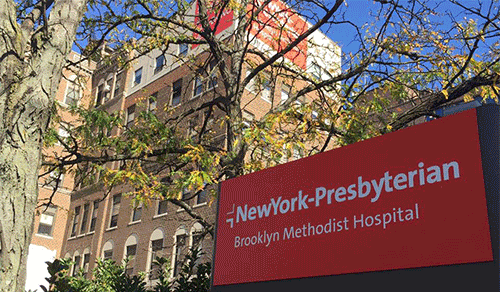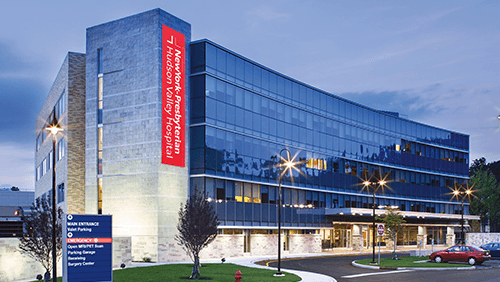At NewYork-Presbyterian, our cardiologists work with specialists across the clinical spectrum to provide comprehensive, state-of-the-art care and cardiology services to every patient. Our team is committed to diagnosing and treating the entire range of conditions that can affect the heart, and, where possible, preventing cardiovascular problems before they start. NewYork-Presbyterian cardiologists also address factors associated with increased cardiovascular risk by regulating cholesterol levels, high blood pressure, heart disease risk factors, and conditions such as diabetes. As your partner in health, we’ll ensure that you have all the information needed to make informed decisions about your care.
What is cardiology?
Cardiology is a branch of medicine focused on the heart and cardiovascular system. Among the conditions cardiologists commonly diagnose and treat are coronary artery disease, high blood pressure, heart failure, valvular heart disease, and congenital heart defects—a significant risk factor for heart attacks and strokes.
When should I see a cardiologist?
Many patients see a cardiologist for the first time on the recommendation of their primary care physician. This referral may be based on the presence of any symptoms, physical examination, and family history. If you have heart disease or are at elevated risk, your cardiologist will recommend an appropriate schedule for check-ups and monitoring.
What is a heart attack, and what should I do if I think I'm having one?
A heart attack occurs when the flow of oxygen-rich blood through the arteries that feed the heart is blocked, causing damage to the heart muscle. Symptoms include chest pain, shortness of breath, nausea, sweating, and lightheadedness. Women may experience a heart attack differently from men, with sudden pain in the neck, arm, back, or jaw. If you think you are having a heart attack, seek emergency medical help immediately by calling 911 or your local emergency number.
What is the difference between a cardiologist and a cardiac surgeon?
A cardiologist is a doctor who specializes in diagnosing and treating heart conditions with medications, lifestyle changes, and non-surgical procedures. They may also provide care to patients who are at high risk for heart problems, such as those with a family history of cardiac disease. A cardiac surgeon performs surgeries on the heart and its related structures, for example, coronary artery bypass grafting (CABG)—commonly known as heart bypass surgery—in which we establish a new pathway for blood flow to the heart or heart valve repair/replacement to ensure correct blood flow within the heart. Interventional cardiologists can often address these conditions with less invasive techniques. Both cardiologists and cardiac surgeons have advanced specialized training in their field.
What are some common heart tests and procedures?
Cardiologists use a variety of tests to diagnose and monitor conditions that affect the heart. In addition to blood tests, electrocardiograms (EKG/ECG), echocardiograms, a cardiac MRI, and stress tests may be ordered to get information about how blood is flowing through the heart, how the heart performs under stress, and whether the electrical impulses that regulate the heart’s activities are working properly.
Common procedures include cardiac catheterization/coronary angiograms. During a cardiac catheterization/coronary angiogram, a doctor will insert a thin flexible tube called a catheter into a blood vessel and guide it toward your heart. Dye is then injected into the catheter. The dye helps the doctor see the blood flow in your coronary arteries and if there is any narrowing of the blood flow. These procedures not only provide additional information but allow the cardiologist to treat certain conditions.
Is high blood pressure related to heart diseases?
Blood pressure is the force a person’s blood exerts on the walls of the blood vessels that carry it throughout the body. When this force is too high, it is called hypertension or high blood pressure. This condition puts extra strain on your heart and blood vessels thereby increasing the risk of heart disease, heart attacks, strokes, and other serious conditions such as chronic kidney disease. Managing blood pressure through lifestyle changes and medications can significantly reduce these risks.
What are the treatment options for heart conditions?
Depending on your diagnosis, treatment options for heart-related conditions may include lifestyle changes, medications, medical procedures, and surgery. Your cardiologist will work with you to determine the best treatment plan based on a variety of factors including your medical history, age, and any other conditions you may have.
Can heart diseases be cured?
While some forms of heart disease can be managed effectively, they may not be curable. However, with proper treatment and lifestyle changes, many people with heart disease can recover and live long and healthy lives.
What are some risk factors associated with heart disease?
Some of the major risk factors associated with heart disease are advanced age, diabetes, obesity, a history of high cholesterol, or a family history of coronary artery disease. Certain lifestyle factors can also put you at increased risk, including smoking, excessive alcohol consumption, a diet high in cholesterol and saturated and trans fats, and not getting enough exercise.
Why choose NewYork-Presbyterian for your heart care?
NewYork-Presbyterian is at the forefront of research and innovation in heart care. We've built up our experience over decades, developing and refining heart procedures that set the standard for other institutions. Today, we treat more heart patients than any top hospital in the nation.* Our affiliation with two highly ranked medical schools means we have the expertise to address the full spectrum of conditions that affect the heart, including angioplasty surgery, coronary bypass surgery, catheter ablations, and heart transplants.
NewYork-Presbyterian is also one of the only centers in New York where cardiac surgeons use the latest in robotic technology to provide patients with an unmatched level of precision compared to traditional surgical methods.
*Based on US News & World Report, 2023-2024 Top 50 Cardiology, Heart and Vascular Surgery rankings
This content has been reviewed by the following medical editors.










